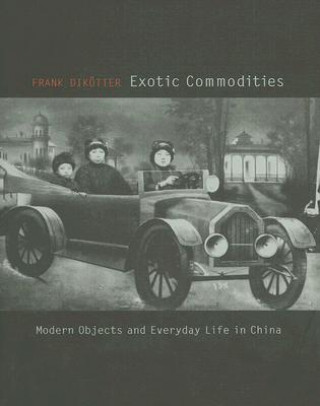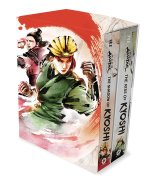
Kód: 11361512
Exotic Commodities
Autor Frank Dikotter
Exotic Commodities is the first book to chart the consumption and spread of foreign goods in China from the mid-nineteenth century to the advent of communism in 1949. Richly illustrated and revealing, this volume recounts how exot ... celý popis
- Jazyk:
 Angličtina
Angličtina - Vazba: Pevná
- Počet stran: 382
Nakladatelství: Columbia University Press, 2007
- Více informací o knize

Mohlo by se vám také líbit
-

Zebras
365 Kč -

Faith-Rooted Organizing
545 Kč
Darujte tuto knihu ještě dnes
- Objednejte knihu a zvolte Zaslat jako dárek.
- Obratem obdržíte darovací poukaz na knihu, který můžete ihned předat obdarovanému.
- Knihu zašleme na adresu obdarovaného, o nic se nestaráte.
Informovat o naskladnění knihy
Zadejte do formuláře e-mailovou adresu a jakmile knihu naskladníme, zašleme vám o tom zprávu. Pohlídáme vše za vás.
Více informací o knize Exotic Commodities
Nákupem získáte 188 bodů
 Anotace knihy
Anotace knihy
Exotic Commodities is the first book to chart the consumption and spread of foreign goods in China from the mid-nineteenth century to the advent of communism in 1949. Richly illustrated and revealing, this volume recounts how exotic commodities were acquired and adapted in a country commonly believed to have remained "hostile toward alien things" during the industrial era. China was not immune to global trends that prized the modern goods of "civilized" nations. Foreign imports were enthusiastically embraced by both the upper and lower classes and rapidly woven into the fabric of everyday life, often in inventive ways. Scarves, skirts, blouses, and corsets were combined with traditional garments to create strikingly original fashions. Industrially produced rice, sugar, wheat, and canned food revolutionized local cuisine, and mass produced mirrors were hung on doorframes to ward off malignant spirits.Frank Dikötter argues that ordinary people were the least inhibited in acquiring these products and therefore the most instrumental in changing the material culture of China. Landscape paintings, door leaves, and calligraphy scrolls were happily mixed with kitschy oil paintings and modern advertisements. Old and new interacted in ways that might have seemed incongruous to outsiders but were perfectly harmonious to local people.This pragmatic attitude would eventually lead to China's own mass production and export of cheap, modern goods, which today can be found all over the world. The nature of this history raises the question, which Dikötter pursues in his conclusion: If the key to surviving in a fast-changing world is the ability to innovate, could China be more in tune with modernity than Europe?
 Parametry knihy
Parametry knihy
1882 Kč
- Plný název: Exotic Commodities
- Podnázev: Modern Objects and Everyday Life in China
- Autor: Frank Dikotter
- Jazyk:
 Angličtina
Angličtina - Vazba: Pevná
- Počet stran: 382
- EAN: 9780231141161
- ISBN: 0231141165
- ID: 11361512
- Nakladatelství: Columbia University Press
- Hmotnost: 1465 g
- Rozměry: 255 × 199 × 33 mm
- Datum vydání: April 2007
Oblíbené z jiného soudku
-

Dune
216 Kč -

Haunting Adeline
621 Kč -

Berserk Deluxe Volume 2
1092 Kč -

White Nights
89 Kč -

Powerless
268 Kč -

Atomic Habits
330 Kč -

Dune Messiah
228 Kč -

Berserk Deluxe Volume 3
1142 Kč -

One Day
221 Kč -

Berserk Deluxe Volume 1
1115 Kč -

Iron Flame
368 Kč -

Surrounded by Idiots
213 Kč -

Harry Potter and the Prisoner of Azkaban (Minalima Edition)
993 Kč -

Gravity Falls Journal 3
443 Kč -

Heaven Official's Blessing: Tian Guan Ci Fu (Novel) Vol. 1
420 Kč -

The Creative Act
568 Kč -

Dune
276 Kč -

Hunting Adeline
624 Kč -

A Little Life
290 Kč -

Children of Dune
230 Kč -

Heaven Official's Blessing: Tian Guan Ci Fu (Novel) Vol. 2
427 Kč -

Bungo Stray Dogs, Vol. 8 (light novel)
383 Kč -

Percy Jackson and the Olympians 5 Book Paperback Boxed Set
944 Kč -

Solo Leveling, Vol. 1
440 Kč -

The Prisoner's Throne
247 Kč -

Court of Thorns and Roses
268 Kč -

Cry Baby Coloring Book
276 Kč -

Fourth Wing
407 Kč -

Icebreaker
199 Kč -

Berserk Deluxe Volume 6
1089 Kč -

Avatar, the Last Airbender: The Kyoshi Novels (Box Set)
986 Kč -

The 48 Laws of Power
608 Kč -

House of Leaves
611 Kč -

Twisted Lies
213 Kč -

Dune Messiah
272 Kč -

No Longer Human
359 Kč -

48 Laws Of Power
331 Kč -

Twisted Games
213 Kč -

Caraval Paperback Boxed Set
902 Kč -

Solo Leveling, Vol. 2
543 Kč -

Open Circuits
907 Kč -

Berserk Deluxe Volume 5
1119 Kč -

Heaven Official's Blessing: Tian Guan Ci Fu (Novel) Vol. 3
436 Kč -

Berserk Deluxe Volume 4
1125 Kč -

Court of Mist and Fury
206 Kč -

SOLO LEVELING V08
436 Kč -

English File Upper Intermediate Multipack A (4th)
531 Kč -

CHAINSAW MAN V14
254 Kč -

Before the Coffee Gets Cold
184 Kč
Osobní odběr Praha, Brno a 12903 dalších
Copyright ©2008-24 nejlevnejsi-knihy.cz Všechna práva vyhrazenaSoukromíCookies



 Vrácení do měsíce
Vrácení do měsíce 571 999 099 (8-15.30h)
571 999 099 (8-15.30h)